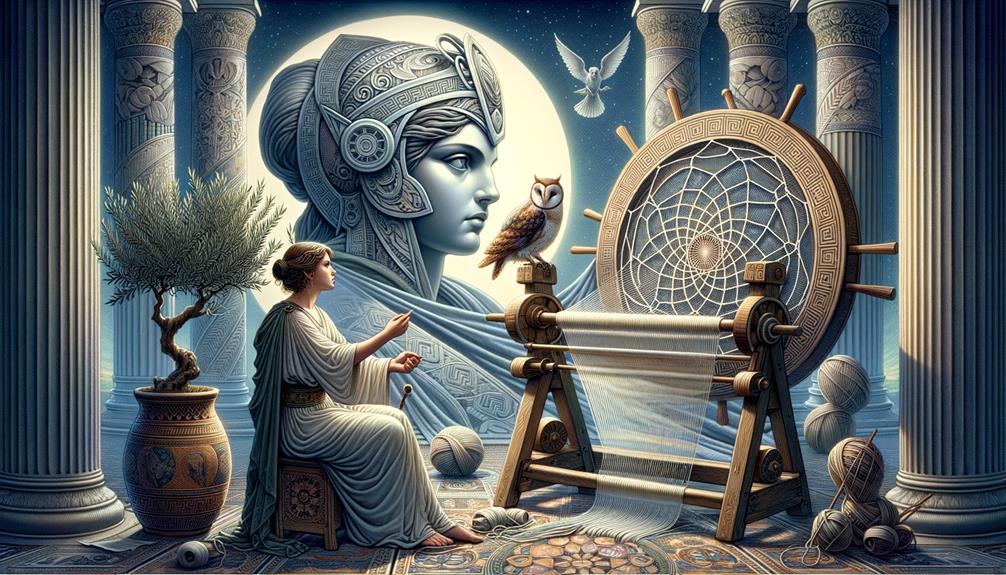Have you ever thought about how the ancient Greeks spun intricate tales, much like a spider intricately spinning its web? These stories were meant to teach us some key lessons about human nature. One such narrative is the legendary feud between Athena, the goddess of wisdom and artistry, and Arachne, an ordinary woman celebrated for her exceptional weaving abilities. This feud is far more than an enthralling yarn about divine punishment. It's like a mirror reflecting eternal problems like too much pride, rebellion against power, and the blurred boundary between brilliance and insanity. You might ask yourself, what can we, as people of the modern era, learn from such an old story? As we peel back the layers of this myth, get ready to find the lasting wisdom it holds, hidden in the strands of a cosmic clash.
The Provocative Challenge

Let's get right to the heart of the matter. Picture this: Arachne, a mortal, has the guts to believe she can outperform Athena, the goddess of wisdom and skills, in weaving. It's a scenario that would have the ancient Greeks shaking their heads in disbelief. Arachne's sheer audacity provokes Athena, sparking a high-stakes weaving contest that becomes a test of both their skills.
This isn't just a friendly competition. It's a dangerous gamble, a contest that is as much about human presumption as it is about artistic skill. It's the very essence of the story of Arachne, a story that has its roots in ancient Greek mythology.
Arachne's refusal to back down from Athena sets off a chain reaction of events that ends with a severe divine punishment. It's a stark reminder of the perilous consequences of hubris in Greek mythology. By daring to challenge a goddess, Arachne steps over a line that should not be crossed.
The Epic Weaving Contest

Let's take a closer look at our main event – the legendary weaving competition. Here, Athena, the goddess of wisdom and crafts, has a bone to pick with Arachne because of her exceptional weaving skills. Athena tosses down the gauntlet, and what follows is a spectacular show of ability, arrogance, and a harsh dose of divine punishment.
Here's a quick breakdown of how things played out:
| Stage | Action | Outcome |
|---|---|---|
| 1 | Athena throws down the gauntlet | The Weaving Contest begins |
| 2 | Arachne steps up to the plate | Arachne's work outshines Athena's |
| 3 | Athena retaliates | Arachne gets hit with a shuttle |
| 4 | Arachne undergoes a change | Arachne turns into a spider |
In this showdown, both Athena and Arachne produce breathtaking tapestries. Athena's piece showcases the gods in all their splendor, while Arachne's work exposes the gods' shortcomings. Athena, unable to stomach the harsh truths in Arachne's piece, lashes out at her and turns her into a spider. This grim turn of events highlights the severe consequences of questioning divine rule.
Beyond the cautionary tale of overconfidence, this epic showdown also gives us a little fun fact. Did you know the term 'arachnid' comes from Arachne's spider transformation? So, the next time you come across a spider, remember the tale of Arachne and Athena's weaving contest!
Divine Wrath and Retribution

Stepping into the world of divine anger and punishment, it's evident that Greek mythology is filled with stories of gods inflicting severe penalties for human arrogance. A prime example of this divine anger is Athena. She once encountered Arachne, a mortal who had the audacity to challenge her in a weaving competition. Upon seeing Arachne's work, Athena unveiled her true identity. Despite the exceptional quality of Arachne's creations, which perfectly represented the gods' history, Athena, the Goddess of Wisdom, was far from impressed.
Athena's reaction was quick and ruthless. She turned Arachne into what we now refer to as the first Spider. This act was not merely a punishment but a firm reminder of the gods' dominance. Here are some key takeaways from this legendary rivalry:
- Arrogance often invites divine punishment.
- The Greek gods, although sometimes petty and jealous, were formidable and not to be trifled with lightly.
- Athena's transformation of Arachne highlighted the gods' ability to impose their will on humans.
- The story of Athena and Arachne serves as a warning against defying the divine order.
Arachne's Unexpected Transformation

Let's dive into an intriguing tale about Arachne, a mortal woman who had the audacity to defy the powerful Greek gods. Known for her exceptional weaving skills, Arachne created a tapestry that was so magnificent, it caught the attention of all the divine onlookers.
Even Athena, the goddess of wisdom, found herself amongst the 44 spectators, completely engrossed in watching Arachne's adept hands at work. However, as time passed, Athena's admiration slowly transformed into intense envy. Unable to suppress her anger any longer, Athena smote Arachne. This act served as a grim reminder of the gods' supreme power in Ancient Greece.
But that wasn't the end for Arachne. In an astonishing plot twist, she underwent a transformation. From a woman, she turned into a creature that continues her weaving even today. Yes, you guessed it right – a spider. This unexpected transformation has been famously narrated in Ovid's work, Metamorphoses, which offers a deep insight into the unpredictable disposition of the gods.
Arachne's fate has left behind a lasting legacy, etched in our minds whenever we see a spider. This story teaches us about the fickle nature of the gods and the consequences of mortal arrogance – serving as a stark reminder of our place in the grand scheme of life.
Unraveling the Myth's Lessons

Let's take a closer look at the story of Athena and Arachne. This myth is not just a tale, it's filled with meaningful lessons about overconfidence, the risks of putting ourselves on the same pedestal as gods, and the severe outcomes of upsetting celestial beings. The character of Arachne, a young woman, teaches us that extreme arrogance can lead to disastrous outcomes. She was renowned for her weaving skills. However, when she was warned about the risks of equating herself with gods by an old woman (who was actually Athena in disguise), Arachne didn't step back.
From this myth, we can take away four main lessons:
- *Respect for the gods*: Arachne's boldness to question Athena eventually led to her downfall.
- *Humility*: Athena would have pardoned Arachne if she had shown regret, but Arachne stood her ground.
- *Reverence*: The ancient Greeks firmly believed in respecting the divine, while also acknowledging their human limitations.
- *Retribution*: The gods were quick to discipline arrogance, as demonstrated when Arachne was turned into a spider.
Frequently Asked Questions
What Moral Was Learned From a Story Associated With Athena From Mythology?
The tale of Athena from mythology has given me a deep understanding that overconfidence and excessive pride, particularly when directed towards divine entities, could result in disastrous consequences. It highlighted the value of being modest when displaying one's abilities and acknowledging the supremacy of the gods.
What Is the Theme From the Myth Athena and Arachne?
The story of Athena and Arachne serves as a stern reminder about the pitfalls of arrogance. It tells us why it's not wise to challenge those who hold divine power and underscores the value of staying humble, especially when we compare ourselves to the gods.
What Is the Myth of Arachne and Athena Story?
Do you know about the fable of Arachne and Athena? In this tale, Arachne, who was a master at weaving, decided to challenge Athena, the deity of wisdom and craftsmanship. The competition between them climaxed when Athena, perturbed by Arachne's excessive pride, turned her into a spider. This serves as a stark warning against the perils of arrogance.
What Is the Conflict of the Arachne Myth?
In the tale of Arachne, the main problem can be traced back to Arachne's oversized ego. She has the audacity to question Athena's dominance, which is quite a bold move. The fact that she doesn't back down results in a divine backlash, which serves as a potent reminder of what can happen when pride and arrogance get the better of us.

